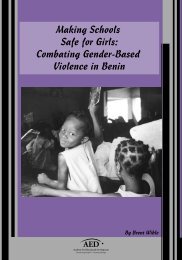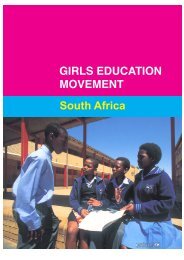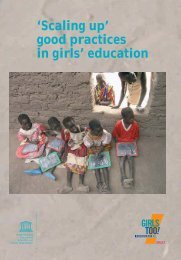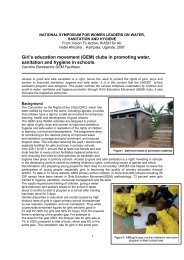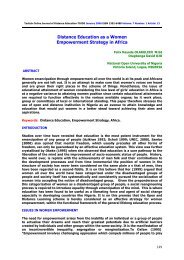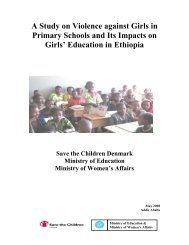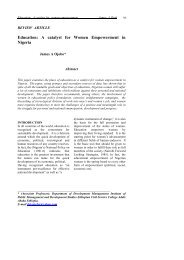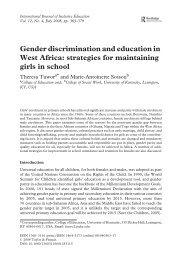Promoting basic education for women and girls ... - library.unesco-ii...
Promoting basic education for women and girls ... - library.unesco-ii...
Promoting basic education for women and girls ... - library.unesco-ii...
You also want an ePaper? Increase the reach of your titles
YUMPU automatically turns print PDFs into web optimized ePapers that Google loves.
is a highly decentralized institution that operates<br />
nine centres spread throughout the country. It is run<br />
by regional officers fully utilizing the traditional admin-<br />
iSabenta <strong>ii</strong>n istrative <strong>and</strong> political structure (traditional chiefs, inner<br />
councils, rural development motivators, head teachers,<br />
<strong>and</strong> community leaders) in the development <strong>and</strong> conduct<br />
of its programmes.<br />
There are two parallel programmes (Siswati <strong>and</strong> English)<br />
<strong>and</strong> these operate at three levels: (a) <strong>basic</strong> literacy; functional<br />
a<br />
literacy; <strong>and</strong> (c) AUPE (Adult Upper Primary Education).<br />
The functional literacy programme teaches a wide range of life skills: sewing, carpentry, computer opera-<br />
tions, weaving, hair-dressing, poultry farming, horticul-<br />
ture, catering, etc. Available statistics show that these<br />
w<br />
pro-<br />
grammes have been <strong>women</strong> dominated. In the year 2000,<br />
<strong>for</strong> example, the total enrolment was 4,074 <strong>and</strong> 2,587 (i.e.<br />
63.50 per cent) were <strong>women</strong>.<br />
AUPE is intended to provide: (a) adults with the opportunity to progress beyond conventional literacy <strong>and</strong><br />
numeracy; (b) adults with the means of achieving a quali-<br />
Swazil<strong>and</strong><br />
d<br />
Many <strong>girls</strong> drop out of school be<strong>for</strong>e the last grade of primary <strong>education</strong>. Many more do not go to school n<br />
at<br />
all. Poverty <strong>and</strong> early pregnancies prevent others from<br />
into the <strong>for</strong>mal <strong>basic</strong> <strong>education</strong> system. The non-<br />
<strong>for</strong>mal route, provided by Sabenta, has been trying to fill this vacuum <strong>for</strong> both boys/<strong>girls</strong> <strong>and</strong> men/<strong>women</strong>.<br />
nfitting There are 222,000 Swazi<br />
who are unable to read,<br />
write <strong>and</strong> count – one<br />
of whom could be your<br />
relative. Ask <strong>for</strong> a <strong>for</strong>m at<br />
the in<strong>for</strong>mation desk <strong>and</strong><br />
as many people as<br />
with Sabenta, your<br />
literacy provider.<br />
lregister lpossible<br />
33S



